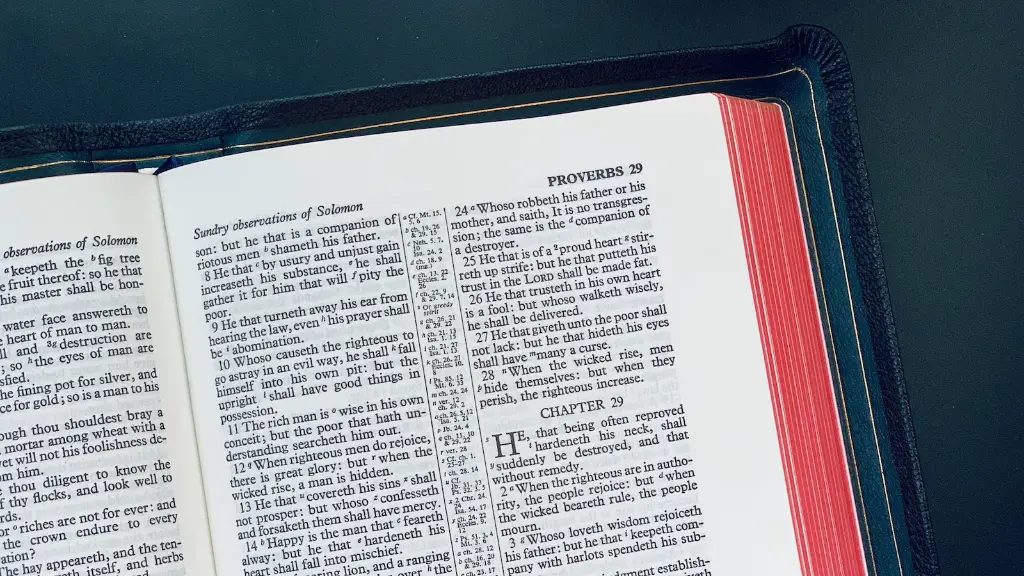Reading the Bible can be a daunting endeavour for the average reader. For one, the Bible is huge. It contains 66 books spanning across the Old and New Testament. For two, the books in the Bible were written many centuries ago, and often in languages assumed to be outdated. Three, it is hard to know where to start, and many questions can arise. Should I read it in chronological order?
Proponents of reading the Bible in chronological order believe that reading it in this order is the best way to understand the story it has to tell. The logical sequence of events can be followed easily, making it easier to understand the Bible’s historical, political, geographical and spiritual context. Intricate details and interconnections can be easily understood, strengthening the reader’s understanding of the divine message.
Opponents argue that there are other times that the Bible can be read in a more meaningful way. Reading it instead by topics, or by books such as the Letters of Paul, can give the reader a better understanding of Jesus’ teachings, and cause them to reflect on certain issues in a deeper way. Moreover, due to its topically linked nature, the Bible has been written in a certain order, and that order can help to show the progress of God’s message through the ages. Consequently, proponents of this method argue that any chronological reordering could disrupt the message intended.
Moreover, there are numerous resources online that can help a person to understand the Bible in chronological order. Through them, a reader can access the Bible’s story in an easy to follow, chronological way, making it easier to grasp the message within the Bible. In addition, many of these resources provide readers with helpful annotations and commentaries, enriching their understanding of the Bible.
At the end of the day, how a person reads the Bible is a personal decision. Whilst reading it in chronological order may make it easier to understand, there are also other ways of reading it that can reap great reward. Ultimately, it is up to the individual reader to decide which approach will be the most meaningful to their growth in knowledge and faith.
Prayer Journeys with the Bible
Often, spending time in prayer with the Bible can be hard to fit into a busy schedule. Even when the time is found, it can be difficult to develop and sustain a meaningful relationship between what is read, life’s situations and the prayer journey. However, this method can offer great rewards. By blending prayer with specific and strategic readings of the Bible, readers can approach scripture in a more meaningful and insightful way, allowing them to deepen their understanding of God and grow their spirituality.
Whilst prayer journeys with the Bible are often best conducted with a group, it can also prove beneficial for those who take it upon themselves. Whether it is to gain a better understanding of a passage or to better comprehend how scripture applies to a particular life situation, prayer journeys can help individuals to unlock new spiritual insight into their faith. By parsing the Bible into smaller sections and reflecting on it in different ways, a richer and more fruitful relationship with the Bible can occur.
Moreover, by using a combination of devotions, spiritual readings and prayers, readers can use personal experiences to connect with the scripture. Through contemplation, individuals can come to realisations about their faith and how it should inform decisions and life’s choices. Moreover, depending on the career and lifestyle, different types of prayer and scripture readings can be used to fit into the person’s schedule, providing meaningful opportunities to grow in understanding and faith.
Bible Study Resources
Due to the sheer size of the Bible, it can be difficult to make an informed decision on what to read. Often, choosing relevant passages can prove hard. Fortunately, it is now easier than ever to look into online Bible studies and courses. Through these resources, people can find information about the history, context and meaning behind scripture passages, allowing for a deeper understanding of how the Bible applies to their current life circumstances.
Moreover, many Bible study resources available online can be tailored to specific needs. From courses focusing on specific portions of the Bible, to faith, meditations and study sessions, resources can be chosen to fit into the life of a developing Christian. For those who find traditional church services to be hard to attend, the help of these resources can be of great advantage. Additionally, different interpretation examples can be found through these websites, enabling the reader to view scripture in a different light, and engage in greater discussion with their friends and family.
Finally, using the power of the internet and digital tools, readers can now access the Bible and its teachings in different ways. Free Bible apps, as well as websites with daily devotions, can help to introduce people to the Bible, or help those already on the path to grow further in knowledge and faith. These resources can finally be complemented by online communities, allowing people to read and interact with the Bible together, gaining greater insight and understanding about God and His message.
Reflecting on Scripture
Evidence from many scholars and researchers shows that taking the time to read and reflect on scripture can help to gain insight into the ways of Jesus. By teaching readers to be still in their minds, it teaches people how to pause, look more closely and reflect more deeply. Through reflection, misconceptions can be challenged, biases can be addressed and perspectives can be broadened.
Moreover, by taking time to think on the things read, readers can come to realisations about their lives, and discover the ways in which they can become better people in what they think, feel and do. Reflecting on the scripture with an open mind can help to truly appreciate the power and beauty of the Bible, and generate greater faith in its message.
Furthermore, reflection can help to understand one’s relationship with God in more detail. By reflecting on His teachings, readers can gain clarity about the types of challenges God calls us to study and face. Moreover, He can be better comprehended and appreciated, not as a god that is beyond us, but as a friend who is with us and has provided us with everything we need to face the troubles of life.
Exploring Your Faith
Exploration is an incredibly important aspect of faith. Without it, people can miss out on opportunities to deepen their understanding of God and His workings. Whether this is through asking questions, challenging preconceptions or reading widely, exploration can unearth the hidden spiritual treasures that exist within the Bible.
For many believers, exploration begins within the Bible. Taking time to read it and read it again can be crucial for deepening one’s understanding of God’s plan. Whether it is by focusing on a few books, or working up to read the entire Bible, readers can find invaluable teachings from valuable prophets and apostles that have stood the test of time.
Moreover, listening to the faithful testimonies of others can be a great way to learn about Jesus. Hearing the stories of God’s works and miracles in the lives of others can be a great source of inspiration and can help to bring the Bible to life. Additionally, such testimonies can also show readers how they can apply the teachings of the Bible to their own lives.
Identifying Bible Passages
For some, choosing the right Bible verses to read can be difficult, especially with the vast selection of books available. Fortunately, there are several reliable sources that can help to identify Bible passages most relevant to the reader’s current life situation. From websites, to apps, and even church-based courses, many resources exist that can direct readers to the books, chapters and verses most pertinent to their need.
Moreover, often books of the Bible are characterised by their content and messages. Knowing the theme contained within each book can help readers to identify which books are most suitable for their current situtation. For example, the books of the New Testament known as the Letters from Paul can help to provide readers with guidance and advice on various issues, not least the Christian faith.
Finally, for those struggling with the task of picking out specific passages, many online tools can assist in the process. Whether it is by topic, keyword or book, by using the right search engines, readers can find the passages most relevant to their understanding.
Open Dialogue
Discussions and conversations about the Bible can prove to be incredibly important sources of growth and insight. Through open and honest dialogue between believers, readers can draw sustenance from their conversations and learn new ways of understanding scripture.
Moreover, such discussions can help to address misconceptions and personal doubts, whilst also providing much needed emotional support. This can be especially significant in times of difficulty, when people may have experienced difficulty understanding material, or when engaging with scripture can be overwhelming.
Finally, by holding conversations about the Bible and engaging with each other’s interpretations, readers can develop friendships that can go on to extend beyond the Bible. By engaging in thoughtful questioning and open dialogue, relationships that can span further need not be limited.





